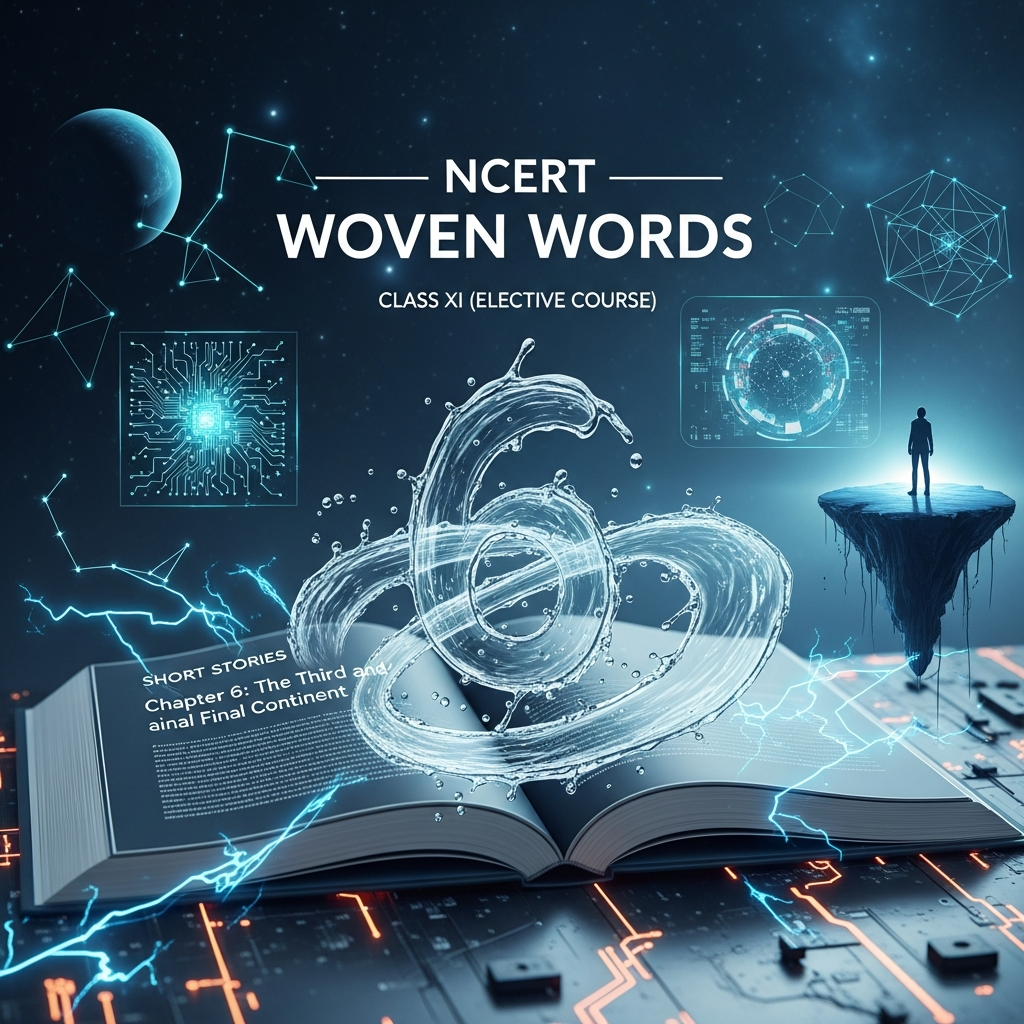Complete Summary and Solutions for The Third and Final Continent – Woven Words NCERT Class XI English Elective, Chapter 6 – Summary, Explanation, Questions, Answers
An engaging story by Jhumpa Lahiri about a young Indian man who emigrates to America, navigating cultural shifts and personal growth. This chapter explores themes of loneliness, adaptation, and the concept of home. It includes all NCERT questions, answers, and exercises for Class XI.
Updated: 2 months ago

The Third and Final Continent
Jhumpa Lahiri | Woven Words Short Stories - Ultimate Study Guide 2025
Introduction to Short Stories - Woven Words
A short story is a brief work of prose fiction. It has a plot which may be comic, tragic, romantic or satiric; the story is presented to us from one of the many available points of view, and it may be written in the mode of fantasy, realism or naturalism.
In the ‘story of incident’ the focus of interest is on the course and outcome of events, as in the Sherlock Holmes story. The ‘story of character’ focuses on the state of mind and motivation, or on the psychological and moral qualities of the protagonist, as in Glory at Twilight. Chekhov’s The Lament focuses on form—nothing happens, or seems to happen, except an encounter and conversations, but the story becomes a revelation of deep sorrow.
The short story differs from the novel in magnitude. The limitation of length imposes economy of management and in literary effects. However, a short story can also attain a fairly long and complex form, where it approaches the expansiveness of the novel, which you may find in The Third and Final Continent in this unit.
Key Elements
- Plot Patterns: Comic, tragic, romantic, satiric.
- Points of View: Multiple perspectives in fantasy, realism, naturalism.
- Types: Story of incident (events), story of character (psychology).
- Economy: Brevity demands concise management and effects.
Reprint 2025-26
Author: Jhumpa Lahiri (1967– )
Jhumpa Lahiri is an American author of Indian origin. She was born in London to Bengali parents from Kolkata and grew up in Rhode Island, USA. She is a Pulitzer Prize winner for her debut collection Interpreter of Maladies (2000). Her works often explore the immigrant experience, cultural displacement, and identity.
The main theme in Lahiri’s stories is the quiet struggles of assimilation, the tension between tradition and modernity, and the subtle bonds formed across cultures. The present story illustrates this through the narrator's journey across continents and his encounters with American life.
Major Works
- Interpreter of Maladies (1999, Pulitzer winner)
- The Namesake (2003, novel)
- Unaccustomed Earth (2008)
Key Themes
- Immigrant identity and cultural hybridity
- Family, marriage, and generational gaps
- Subtle cross-cultural connections
Style
Realistic, understated; focuses on everyday details to reveal emotional depths, blending Indian and American sensibilities.
Reprint 2025-26
Full Story Text: The Third and Final Continent
Note: Full story text is based on the provided PDF excerpt. For the complete narrative, refer to the textbook. Remaining pages continue with the narrator's wife Mala's arrival, their adjustment to American life, and reflections on cultural adaptation.
Reprint 2025-26
Story Summary: English & Hindi (Detailed Overview)
English Summary (Approx. 1.5 Pages)
The narrator, an Indian immigrant, leaves for England in 1964 with little money, living frugally among Bengali bachelors while studying at LSE. In 1969, his marriage is arranged, coinciding with a job offer at MIT. He flies to Calcutta for the wedding, then to Boston, reading a guidebook en route and arriving amid the moon landing excitement.
Settling at the YMCA, he adapts to American life—cornflakes for meals, thermos tea—amid noisy nights. Renting a room from the eccentric Mrs. Croft, an elderly widow, he endures her ritualistic chats about the moon flag, echoing his own sense of displacement. His arranged bride, Mala, arrives shyly; initially distant, she warms through shared routines and Mrs. Croft's unwitting approval, symbolizing cross-cultural bridges.
Years later, with a son, the narrator reflects on his "third and final continent," finding stability in adaptation, underscoring themes of resilience and quiet triumphs in immigrant life.
हिंदी सारांश (संक्षिप्त)
1964 में भारत छोड़कर इंग्लैंड पहुँचने वाला कथावाचक, गरीबी में बंगाली छात्रों के साथ रहता है। 1969 में विवाह तय होता है, साथ ही MIT नौकरी मिलती है। कलकत्ता शादी के बाद बोस्टन जाता है, चंद्रमा लैंडिंग के बीच।
YMCA में बसता है, अमेरिकी जीवन अपनाता है—कॉर्नफ्लेक्स भोजन, थर्मॉस चाय। वृद्ध मिसेज क्रॉफ्ट के घर कमरा किराए पर लेता है, चंद्रमा ध्वज पर उसकी बातें सुनता। पत्नी माला आती है, शर्मीली; साझा दिनचर्या और क्रॉफ्ट की स्वीकृति से निकटता बढ़ती।
बाद में पुत्र के साथ, वह तीसरे और अंतिम महाद्वीप में स्थिरता पाता, अप्रवासी जीवन की सहनशीलता दर्शाता।
Reprint 2025-26
Plot Summary: Key Events & Structure
Overview
The story chronicles the narrator's migration across three continents, framed as a retrospective on adaptation. Central conflict: Cultural dislocation vs. gradual belonging, resolved through familial and unlikely bonds.
Structure in Phases
- Exposition: Journey from India to England; communal Bengali life.
- Rising Action: Marriage/job; Boston arrival, YMCA struggles, Mrs. Croft encounter.
- Climax: Mala's arrival and initial awkwardness; moon flag ritual as cultural mirror.
- Resolution: Family life in America; reflections on permanence.
Points to Ponder
- Symbolism: Moon flag = American exceptionalism; thermos = portable traditions.
- Narrative Voice: First-person retrospective, blending detachment and intimacy.
- Cultural Insight: Arranged marriage as anchor amid diaspora flux.
Tip: Epistolary elements (guidebook, letter) highlight learning curves in assimilation.
Understanding the Text
1. Why does the narrator feel the need to explain the purpose of his visit to Mrs Croft?
- The narrator, as a recent immigrant, approaches renting the room like a formal interview, bringing an MIT employment letter to establish credibility. This stems from his unfamiliarity with American housing norms and cultural caution—having "never lived in the home of a person who was not Indian." It underscores his methodical adaptation, using proof to bridge potential gaps in trust.
- Mrs Croft's bold, clamorous demeanor and questions ("Harvard or Tech?") heighten his anxiety; the letter asserts his legitimacy as a "Tech boy," countering her skepticism about Harvard renters. This moment reveals his soft-spoken nature against her fierceness, highlighting early cross-cultural negotiations.
- Broader theme: Immigrants often overcompensate with documentation to navigate perceived barriers, reflecting Lahiri's motif of quiet vigilance in foreign spaces.
2. What does the narrator notice about Mrs Croft’s house and how does it differ from his London home?
- Mrs Croft's house is a fully detached, off-white structure with wooded shingles, chain-link fence, and forsythia bushes—evoking American suburban solidity versus the "stucco row house" in London, which was communal and cramped for penniless Bengalis.
- Interior contrasts: Shabby claw-footed furniture, grand piano piled with papers, lace-skirted table with radio and cane suggest eccentric widowhood and faded grandeur, unlike the shared, makeshift Bengali space with egg curry on newspapers and Grundig reel-to-reel music.
- This difference symbolizes the narrator's progression: From collective immigrant struggle to solitary American eccentricity, foreshadowing his evolving independence.
3. How does the narrator’s wife react to Mrs Croft and why?
- Mala, fresh from arranged marriage and India, is mortified by Mrs Croft's "no lady visitors!" insistence, blushing and avoiding eye contact, viewing the elderly American as an authority figure in a strange land.
- Her reaction stems from cultural shock—Mrs Croft's fierce, bellowing commands and moon flag ritual clash with Bengali reserve; yet, gaining Mrs Croft's approval ("Take your wife... be good to her") validates Mala's place, easing her homesickness.
- It marks a turning point: Mrs Croft's unwitting blessing bridges traditions, transforming embarrassment into empowerment for the couple's new life.
Talking about the Text - Discussion Prompts
Discuss in pairs or small groups
1. The story highlights the immigrant's journey of adaptation. How does the narrator's routine with Mrs Croft aid his settling in America?
- The nightly "splendid" ritual, though awkward, imposes structure amid chaos, echoing the guidebook's tips and providing human contact—contrast with YMCA isolation.
- Discuss: Rituals as anchors; how do small eccentricities (moon flag) humanize the "other," fostering unexpected empathy across generations/cultures?
- Modern parallels: Immigrant apps/forums today vs. 1960s guidebooks—does technology accelerate or complicate adaptation?
- Personal: Share adaptation stories; Lahiri's understated humor softens displacement's pathos.
2. Arranged marriages often carry stereotypes, but Lahiri portrays one with nuance. How does the narrator's view evolve?
- Initial duty-bound detachment (no consolation for Mala's tears) shifts to tenderness via shared American trials, like cornflakes and Mrs Croft's nod.
- Explore: Stereotypes of passivity vs. resilience; generational duty in diaspora—does distance strengthen or strain bonds?
- Gender lens: Mala's embroidery talents dismissed for complexion, yet she adapts quietly, subverting expectations.
- Extension: Compare with love marriages; role of food (egg curry to cornflakes) in marital intimacy.
Appreciation & Analysis
1. The moon landing serves as a backdrop. How does it parallel the narrator's "landing" in America?
- The 1969 event symbolizes American ambition ("man’s most awesome achievement") amid the narrator's quiet odyssey—both voyages into unknown "seas" (Sea of Tranquillity vs. continents).
- Mrs Croft's ritual amplifies irony: Her "splendid" echoes national pride, but for the immigrant, it's a disorienting fanfare, like guidebook warnings of no "English cup of tea."
- Thematically, it underscores hybrid triumphs—lunar flag plants roots, as the couple's family does, blending epochs in personal history.
2. Lahiri's style is minimalist. How does she use everyday details to convey emotional depth?
- Objects like thermos, cornflakes, and forsythia bushes ground abstraction—souring milk evokes transience; ruffled blouse details Mrs Croft's faded vigor.
- Sensory precision (traffic "deep in my ribs," snowless Boston heat) mirrors internal shifts, economy revealing alienation's subtlety without melodrama.
- Result: Profound resonance in ordinariness, critiquing immigrant "invisibility" while celebrating micro-victories, like Mala's sari in suburbia.
3. The title "The Third and Final Continent" suggests closure. Analyze its implications for the immigrant narrative.
- "Third" maps progression (India, England, America); "final" implies settlement, yet retrospective tone hints at ongoing flux—son’s future unnamed.
- Implications: No true "end" to adaptation; continents as metaphors for layered identities, echoing Lahiri's own biculturality.
- Broader: Challenges linear success myths, affirming hybrid permanence in quiet domesticity over grand arrivals.
4. Mrs Croft as a foil to the narrator: Discuss her role in the story's cultural dialogue.
- Her fierce independence (widowed pioneer) contrasts narrator's dutiful reserve, yet shared "punctuality" and rituals forge unlikely kinship.
- She embodies American archetype—bold, history-haunted—prompting narrator's growth; her blessing to Mala validates the "un-Indian" union.
- Dialogue: Bridges eras/generations, humanizing "otherness"; her desolation parallels immigrant loneliness, universalizing themes.
Language Work
1. Guess from Context (Vocabulary)
- LSE: London School of Economics
- Grundig reel-to-reel: Tape recorder brand
- Hollered: Shouted loudly
- Heralded: Announced/signaled
- Clamorous: Noisy/demanding
- Stucco: Plaster wall finish
- Forsythia bushes: Yellow-flowering shrubs
- Ruffles: Frilled edges
- Chapped: Cracked/dry skin
- Foyer: Entrance hall
- Mortified: Deeply embarrassed
2. Synonyms/Antonyms
| Word from Text | Synonym | Antonym |
|---|---|---|
| Penniless | Impecunious | Affluent |
| Generous | Lavish | Stingy |
| Mortified | Humiliated | Complacent |
| Splendid | Magnificent | Dismal |
3. Idiomatic Expressions
- "God bless America!": Patriotic exclamation
- "On a budget": Living economically
- "Drift off to sleep": Fall asleep gradually
Interactive Quiz - Test Your Understanding
10 MCQs on plot, themes, and language. Aim for 80%+.
Suggested Reading
- Interpreter of Maladies by Jhumpa Lahiri
- The Namesake by Jhumpa Lahiri
Reprint 2025-26

Group Discussions
No forum posts available.
Easily Share with Your Tribe


